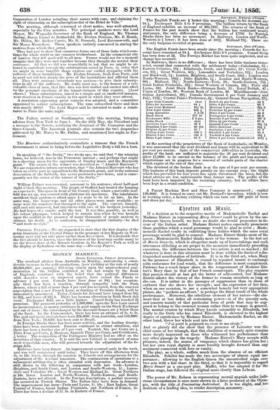i rstrts ant( Ilusir.
If a decision as to the respective merits of Mademoiselle Rachel and Madame Ristori in representing Mary Stuart could be given by the un- fortunate Queen herself, we have no doubt she would pronounce in fa- vour of the Italian artist. Madame Ristori makes especially prominent those qualities which a royal personage would be glad to avow ; Made- moiselle Rachel exults in exhibiting those foibles which the same royal personage-would be glad to conceal. Madame Ristori thinks more of the queen ; Mademoiselle Rachel thinks more of the woman. In the last set of Maria Stuarda, which is altogether made up of leave-takings and such utterances of feeling as are proper to the moments immediately preceding execution, the difference between the two artists is not so marked ; for whatever is done in this situation must be done within the limits of a dis- tinguished manifestation of fortitude. It is in the third act, when Mary in the presence of Elizabeth is roused by repeated taunts to exchange calm endurance for loud wrath, that the difference is most conspicuous. Patience has a much larger share in the temperament of Madame Ris- tori's Mary than in that of her French counterpart. The play renuires that passion should at last get the better of self-control, -but Madame Ristori allows the victory of the former to remain uncertain as long as she can. It is rather in the passages of suppression than in, those of outburst that she shows her strength ; and the expression of her face, when on one occasion, to use a somewhat homely but very appropriate phrase, she "pockets an affront," is perhaps the finest touch of the whole performance. Moreover, the rebellious element of her nature—the de- ment that at last defies all restraining power—is of the queenly sort, and consists mainly of that particular form of pride that may be sup- posed belong to the crowned woman rather than to woman in general- The mental evasion by which Mary kneels ostensibly to :Elizabeth, hilt really to the Deity who has raised Elizabeth, is elevated to the highest degree of significance by Madame Ristori. Mademoiselle Rachel, on time other hand, threw her whole soul into the line
"Pei porte le poignard au corer de ma rivale."
And so plainly did she show that -the presence of Leicester was the chief cause of her triumph, that this ebullition of womanly spite remains more deeply impressed on those who -witnessed her performance than any other passage in the tragedy. Madame Ristori's Mary accepts with pleasure, indeed, the means of vengeance which chance has given her ; but her own royal dignity is more forcibly brought forward than any sentiment connected with love or vanity. The play, as a whole, suffers much from the absence of an efficient Elizabeth. Schiller has made the two sovereigns 'of almost equal im- portance; allowing to the English Queen the uncontrolled reign over two acts with a fair share in the third, so that it is impossible to regard Marie Stuart as a one-part play. Maffei, who has adapted it for the Italian stage, has followed the original more closely than Lebrun.


























 Previous page
Previous page